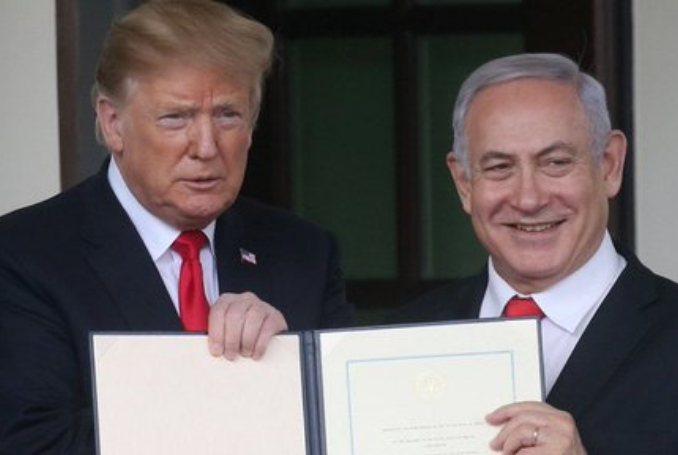
By Benay Blend
In both the United States and Israel, there is a myth that if we could just get rid of certain leaders—namely Trump and Netanyahu—then things would go back to normal, the good old days (in truth, for some but not for others).
“What have we become?” people ask, thereby glossing over the settler-colonial history of both countries. This historical amnesia stems from many factors. It satisfies the human desire for a definable villain, someone to lay the blame on rather than doing the harder work of understanding that it’s the capitalist, colonial system that must be changed.
In no way does this analysis negate the damage done by both leaders. What it does point to is the way that this focus plays into the founding myths of both countries. Indeed, Zionism not only stems from an ideology born out of nineteenth-century nationalism but also bears resemblance to settler states established in the Americas. In this scenario, both sought to present a virgin land, ready for fertilization and development.
Instead of “civilizing” the indigenous population or utilizing their labor, as was done in other colonial enterprises, the problem for Israelis was to find an “empty” land that could be transformed into a Jewish homeland, though this meant erasure of 689,272 residents through some serious historical revision. Like the so-called “virgin land” in the American West, this trope serves to gloss over the Nakba (catastrophe) of 1948 just as the American version disregards the extermination and/or relocation of the American Indigenous population.
In his “Forward” to Ramzy Baroud’s Last Earth: A Palestine Story (2018), Ilan Pappe refers to Al-Nakba al Mustamera, the on-going Nakba, a common term for the period after 1948. Moreover, he explains that discrete chapters in the history of Palestine, such as the disaster of 1948, are not just past events, but instead are a long narrative of massacres, land confiscation, displacement, and assassination. Relying on Patrick Wolfe, who “adapted and applied” the settler-colonial paradigm to Palestine, Pappe explains that the colonial project is on-going, as is Palestine’s resistance to it.
Similarly, Roxanne Dunbar-Ortiz writes in An Indigenous History of the United States (2014) that the history of United States is also that of settler-colonialism, i.e. the founding of a country established on the premise of white supremacy, the widespread use of African slavery, and a strategy of “genocide and land theft” that disenfranchised the Indigenous population (p.2). She adds that “those who seek history with an upbeat ending” (p. 2), or for the present purposes, those who seek to find a Golden Age in America’s past, might be looking far and wide for neither that conclusion nor that bygone age, exists.
Trump and Netanyahu, then, are merely just the symptoms, while Zionism, settler-colonialism, neoliberalism, capitalism, and racism are all elements of the disease. Impeaching Trump will not bring about a better world to come. Writing for Aljazeera as far back as 2015, Hamid Dabashi claims that “Trump is a symptom not the disease.”
In short, Dabashi adds, “he is a decoy, a diversion so outrageous, so disgusting that it overwhelms and hides the real disease.” The problem, he concludes, is “firmly rooted in the political culture of a country that began its history by the mass murder of Native Americans, continued by the systematic slavery of African Americans, and most recently with a stroke of a pen ordered the US population of Japanese descent incarcerated in concentration (internment) camps during World War II.
Writing four years later, Philip Weiss explores a variation of that same mantra used by liberal Zionists to entice their Jewish brethren back into the pro-Israel Democratic fold. According to Weiss, their argument goes something like this: “The only thing we need to do to end the Democratic Party’s disaffection with Israel is to get rid of Netanyahu—and Trump.” Like those who place all blame for America’s problems on the shoulders of Donald Trump, liberal Zionists locate all of the culpability for Israel’s sins on the actions of one person.
“His sins are innumerable and the damage he’s done immeasurable,” writes Gideon Levy, “and it would be great to have him out of our lives, but blaming everything on him is deceiving and a shirking of responsibility.” Yet Levy blames the “values and outlooks” that he says have been “ingrained here during decades of Zionists,” not the values of white supremacy and ethnic cleansing that have been inherent in Zionism since 1948. Levy wishes for a Mandela who would lead a revolution in the nation’s values, rather than lead a revolution that would instead dismantle the Zionist state.
Racism in both countries is not an individual problem but rather embedded in the institutions of each settler-colonial state. When George Bush slipped Michelle Obama a cough drop at John McCain’s funeral, it was viewed by most as a moment of civility, the kind of hands across the aisle so lacking in government today.
George Bush’s history as a war criminal responsible for thousands of deaths in Iraq and Afghanistan after 911 was totally erased by a desire to believe that we only have to be kind to each other in order to topple the racism of Trump’s regime. The same could be said for the practice of “normalization” by Israelis, defined by the Palestinian Campaign for the Academic and Cultural Boycott of Israel (PACBI) in the following way:
It is helpful to think of normalization as a “colonization of the mind,” whereby the oppressed subject comes to believe that the oppressor’s reality is the only “normal” reality that must be subscribed to, and that the oppression is a fact of life that must be coped with.
Those who engage in normalization either ignore this oppression or accept it as the status quo that can be lived with. In an attempt to whitewash its violations of international law and human rights, Israel tries to re-brand itself, or present itself as normal — even “enlightened” — through an intricate array of relations and activities encompassing hi-tech, cultural, legal, LGBT and other realms.
Frederick Douglass, the 19th century escaped slave turned statesman, said that power does not relinquish power without a struggle. Whether that be the dismantling of the Zionist state as advocated by the One State Foundation, the decolonization of the Americas outlined by the Red Nation, or any number of revolutionary struggles not carried out under the mantle of the colonialist enterprise, significant change will not come about by removing one person from leadership and / or advocating unity when all parties are not sharing equal power.
In an era when the governments of both Israel and the United States are working hard to erase the past, it is important to cut through the founding myths of each country in order to chart a clear path forward to a more egalitarian state.
– Benay Blend received her doctorate in American Studies from the University of New Mexico. Her scholarly works include Douglas Vakoch and Sam Mickey, Eds. (2017), “’Neither Homeland Nor Exile are Words’: ‘Situated Knowledge’ in the Works of Palestinian and Native American Writers”. She contributed this article to The Palestine Chronicle.

– Benay Blend earned her doctorate in American Studies from the University of New Mexico. Her scholarly works include Douglas Vakoch and Sam Mickey, Eds. (2017), “’Neither Homeland Nor Exile are Words’: ‘Situated Knowledge’ in the Works of Palestinian and Native American Writers”. She contributed this article to The Palestine Chronicle.







